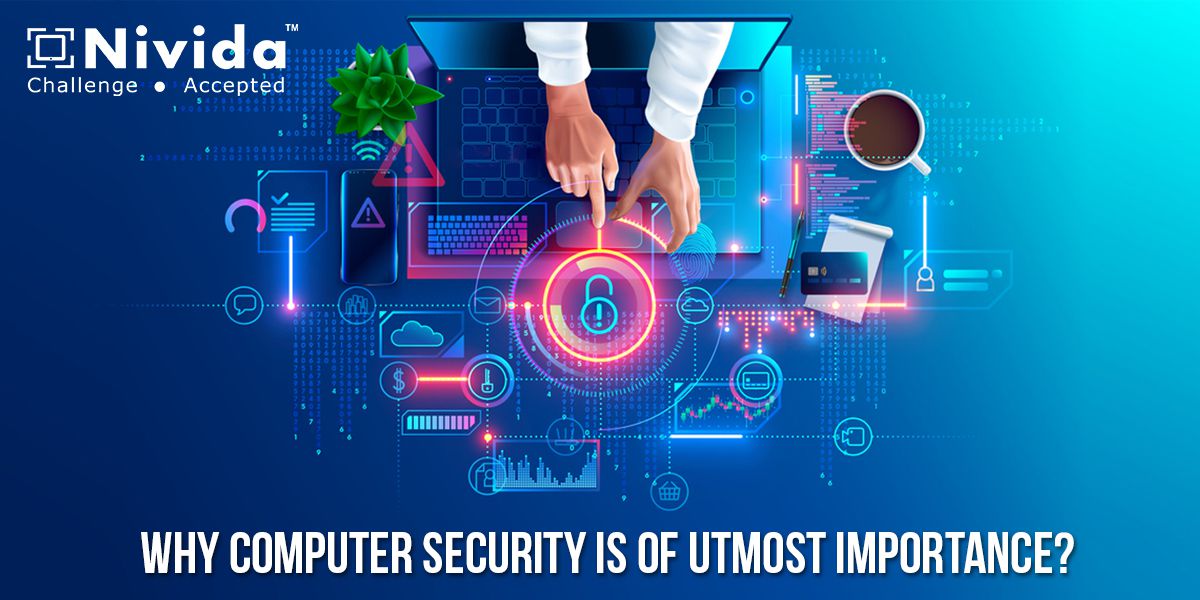In many ways, computers have become indispensable to our daily lives. Keeping our computers safe from viruses and other forms of malware is crucial for the preservation of our data. Why do we care so much about computer security? that's what we'll be talking about here.
The term "computer security," which also goes by the names "cyber security" and "information technology security," refers to the practice of guarding various components of computers. A primary goal of securing the computer is to guard against and identify any intrusions.
Threats and Vulnerabilities in Computer Security:
A threat to computer security is any circumstance that poses a risk to the integrity of a computer system. With the world becoming increasingly digital, cyber threats are increasing daily. Let's examine the wide variety of serious problems and flaws that plague today's computer security systems.
- Viruses:
To put it simply, a computer virus is a harmful piece of software that is secretly downloaded and installed on a user's machine. Any file or programme on the system is at risk of infection because this software can copy itself. In the worst cases, these infections might render the victim's PC utterly useless.
- Computer Worm:+
A computer worm is a malicious programme that spreads itself automatically from one computer to another. Due to their ability to replicate and the speed at which they replicate, computer worms can completely exhaust a system's storage space. They have the ability to alter or remove files, as well as install further viruses. A computer worm can not only spread itself but also steal data and give thieves a backdoor into a system.
- Phishing:
In the cybercrime known as "phishing," the perpetrator poses as a trusted organisation by email, phone, or via text message in an attempt to gain the victim's trust and, in turn, get sensitive information such as passwords and financial data. This leads to stolen identities and monetary loss. Even though people are well-aware of the phishing dangers, it is surprisingly simple to fall for one of these scams.
- Botnet:
A botnet is a group of computers infiltrated by hackers to communicate with one another. A "zombie computer" is a machine that has been infected and is roaming the network looking for new hosts. The compromised machine, now known as the bot, is used to facilitate wider-scale attacks like Distributed Denial of Service.
- Rootkit:
A rootkit is a piece of malicious software that can be installed on a computer to conceal its true nature and allow an intruder access to otherwise secure areas. When installed on a computer, rootkits allow hackers to make unauthorised changes to the system and even run programmes on the host machine.
- Keylogger:
A keylogger is a form of software that is used to monitor the computer’s activity and secretly record a user's keyboard input and other actions. One frequent method for stealing login information is through the use of a keyboard logger.
Why Computer Security is of utmost importance?
There will be big problems and concerns that cannot be addressed until a system for computer security is put into effect. In today's data-driven society, it is more important than ever to safeguard sensitive information and thwart the efforts of would-be thieves.
Maintaining a computer free of viruses and other malware is essential for keeping sensitive data safe and keeping the computer running smoothly.
Types of Computer Security:
The hardware, software, network, as well as electronic data in computer systems, can all be protected by employing the following security strategies.
- Application Security
- Information Security
- Network Security
- Endpoint Security
- Internet Security
Healthy Principles of Computer Security:
With the ever-increasing sophistication of cyberattacks, it's more important than ever to find effective ways to defend against them. Here are a few examples of sound computer security procedures everyone should be familiar with in order to stay safe from the ever-expanding array of online dangers.
- Guarantee the safety of your PC from outside threats: Install Anti-virus software Activate firewall
- You need to keep up with the latest software and updates by regularly updating your system.
- Do not open attachments from strangers in your inbox.
- Create secure passwords and update them frequently.
- Pay no attention to flashing adverts or automatic downloads.
- Learn about basic computer security measures and the most recent online dangers.
- Scanning and backing up your system at regular intervals is essential.
Moreover, you can safeguard your computer through the use of encryption and other measures.

